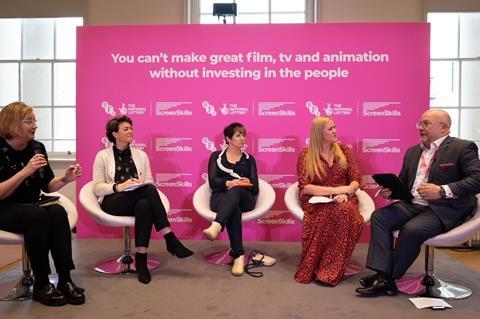
The British Film Institute (BFI) deputy CEO Harriet Finney gave an update on the future of publicly-funded skills support for the UK screen industries, as the National Lottery-funded Future Film Skills programme, administered by national body ScreenSkills, draws to a close at the end of March.
“We need to build a strong matrix of skills support across the whole of the UK. We are now looking at skills clusters across the whole of the UK,” she said, of the upcoming switch from national to regionally-based skills support. They will be announced in the next few weeks.
“It will create six or seven Centres of Excellence for skills across the UK which will plug into the work of ScreenSkills and other organisations have done, for creating this matrix of skills support,” she continued.
Finney was talking at the ScreenSkills Future Film Skills Programme Showcase alongside Gareth Ellis-Unwin, who has headed the Future Film programme since its inception in 2017, with Lyndsay Duthie, CEO of the Production Guild of Great Britain, and Caroline Cooper Charles, CEO of Screen Yorkshire.
“Production is booming, and skills is not keeping up with the workforce and amount of production at the moment. It is putting an enormous amount of pressure on productions, but more importantly on the individuals who are working within these productions,” said Finney. “How do we look at creating clearer paths into the industry? How do we look at retention?”
She said a taskforce is being assembled to advise on how the industry can respond to these challenges.
“We also need to work with government,” Finney added. “The apprenticeship levy does not work, as it stands, for the industry. We pay lots of money in and we don’t get it out.”
The regional skills clusters, which were first introduced in September alongside the BFI’s 10-year National Lottery funding roadmap, Screen Culture 2033, will see £9m invested in skills across the first three years.
“One of the things that is really important is seed funding – it should be a catalyst to get programmes and projects off the ground. The idea is ultimately we can step back because a programme or cluster has been so successful,” added Finney, who specified applications needed to offer match funding from local council, combined authority or local industry who were also willing to put funding against the programme.
Future Film Skills initially ran as a four-year programme from 2017 to 2022, with a one-year extension owing to the Covid-19 pandemic. Over the five years, 119,000 beneficiaries were supported, including 3,330 apprenticeships and 2,765 bursaries awarded totalling £2m.
Centres of Screen Excellence were also set up across the UK to offer eight-week skills training programmes, including Leeds and Elstree, with 98% of the most recent Leeds cohort going into paid work.
Plugging the skills gap
Ellis-Unwin addressed the need for industry, education and government to work together and share responsibility to help plug the ongoing skills shortage in the UK. “No one party owns the challenge, so no one party owns the solution.”
He also addressed the need for some larger studios to take more risks on industry newcomers: “There’s a disconnect between the shop floor and the boardroom – boardroom will always talk highly of corporate social responsibility, opportunity, but they don’t have to deal with the practical impact of caring for someone who is untested, who needs support, who may be on their first job, or may have been the first one in to a newly promoted role. Those people need time, effort and support around them. But that’s at a time where productions are incredibly high tempo, they are high stress.”
He later continued: “When people are being asked to be brilliant under all pressures, they worry about creating opportunities for those that are untested, whether that be in a promotion, whether that be in the start. We need to move towards agreeing that there will be a number of people on any show at a number of grades that aren’t tested,” he said. “Training has to be part of our day-to-day function.”
Ellis-Unwin also addressed the need to relieve time pressures in the commissioning process to help create more fair recruitment practices.
“One thing that often gets ignored is the extreme pressure that late commissioning and financing decision forces onto the production community. Particularly in the independent film space, we have a culture of closing finance very late, and that means you go from a ‘hurry up and wait’, to being in stasis, to ‘go, go, go’.
“That means you don’t have time to consider fair recruitment practices, you are in the cauldron of production quite quickly. Even on big inward investment shows the decision to greenlight comes very, very late.
“My slight concern in this when we talk about [implementing] better hours, still maintaining the output – if we don’t change the fundamental thing that causes the surge down the pipeline, then we’re always going to just try to do the best we can in a very difficult scenario.”

























No comments yet